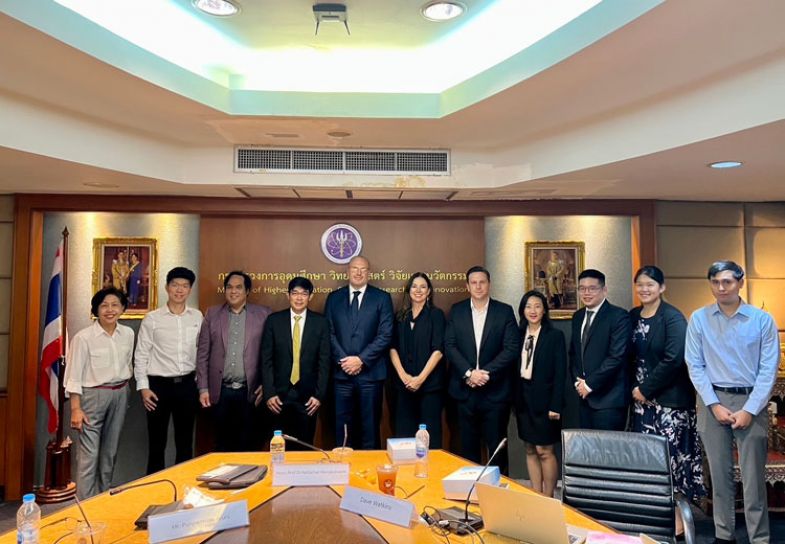
THE Consultancy and Thailand’s Ministry of Higher Education, Science and Innovation have collaborated on a national student sustainability survey to reveal the far-reaching benefits of sustainability education
A highlight of THE Consultancy’s ongoing partnership with Thailand’s Ministry of Higher Education, Science and Innovation (MHESI) has been the conception of a national student sustainability survey.
Since 2021, MHESI has embarked on a nationwide transformation programme for its universities to integrate the United Nations’ Sustainable Development Goals (SDGs) into its research and institutional priorities, which manifests through university curricula. Thai universities have demonstrated their readiness to transcend traditional institutional priorities by placing sustainability as a mainstay for university education. Apart from designating specific courses on sustainability, universities also engaged with innovative initiatives, such as community programmes, internships and work placements, to integrate sustainability into the university curriculum.
THE Consultancy’s survey measured the impact of a sustainability-focused curriculum on students from 94 Thai universities. It evaluated the success of sustainability education in terms of employability. Broadly, the survey serves as a stepping stone towards building a repository of resources relating to sustainability education curricula and its impact on students in Thailand. This will allow MHESI to document, evaluate and improve on institutional progress in its national sustainability education.
Nurturing personal growth and creating sustainable citizens
Findings from the survey suggest that university students become more environmentally conscious after going through university education in Thailand. For instance, 84 per cent of students agreed that their university education has equipped them with the necessary foundations to live their lives in a sustainable manner.

The survey also found that 80 per cent of students expressed their commitment to living sustainably even if the impact of such behaviour is not visible.

These personal convictions have translated into an appetite for social impact. It is encouraging that 59 per cent of students identified social responsibility as a top skill they developed because of sustainable education.

Students are living out these beliefs, which is evident through their heavy involvement in the community. At present, 86 per cent of students are engaged in activities to promote sustainability in their communities. These results suggest how sustainability has shaped graduates’ likelihood to become change agents for sustainability within their own communities.
Employability for a sustainable future
There is an increasing demand for sustainability-specific skills within the South-east Asian market. While there is currently an adequate number of workers who can meet this demand, the creation of new green jobs may inflate the demand for sustainability-skilled workers.
Fortunately, Thailand is well-positioned to address this workforce need. To date, a majority of Thai graduates surveyed (83 per cent) have obtained sustainability-related experience during work placements and internships under their university’s sustainability curriculum. These students are relevantly skilled for an economic landscape in need of more sustainability-specific skills. Moreover, 70 per cent of students surveyed were interested in seeking employment opportunities within sustainability-related industries.
Not only are such experiences and skills useful for securing green jobs but they also allow students to remain relevant in an economy where jobs are expected to change in accordance with the green transition. Sustainability-specific skills are therefore valuable for the long term.

Students who gain future-proof skills are less affected by industry trends and job market fluctuations. With sustainability education, employment opportunities are not just available, they are guaranteed. This may explain why the Thai students surveyed have optimistic attitudes towards employment as a result of undertaking sustainability education. For instance, 77 per cent of Thai students are confident in their employability prospects after graduation. As employment is a key economic driver, Thailand’s economy and living standards have the potential to improve through sustainability education.
Sustainability education has the potential to contribute to a diverse economy by creating an appetite for innovation and entrepreneurship. The survey found that a significant proportion of students surveyed (82 per cent) were inclined to pursue entrepreneurship in sustainability-related fields. In this way, sustainability education fosters a resilient and dynamic economic landscape in Thailand.
The University to Tambon project
In 2021, many universities in Thailand began supporting community-based programmes through the University to Tambon (U2T) project. The U2T project is a national initiative to provide sustainability-related work experience to students in their local communities, with the two-fold aim of increasing the employability of students and benefitting their local communities. The survey proved the effectiveness of the programme, with a majority of students who participated in the programme (86 per cent) noting that they were more confident in their employability compared with their peers who did not take part. Similarly, more students were inclined to pursue entrepreneurship in sustainability-related fields after taking part in the programme than those who did not.
Overall, these 94 Thai universities have demonstrated that sustainability education is not just a supplement to students’ university experience, but a necessary one that delivers practicality and purpose
Contact the THE Consultancy team for more information about how it provides strategic, data-driven guidance to universities and governments globally.




















